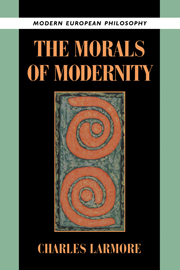5 - Moral Knowledge
Published online by Cambridge University Press: 18 December 2009
Summary
Naturalism is the view that the world, as the totality of what is, consists solely of the physical and psychological phenomena that are the object of the modern natural sciences. The world is but matter in motion, along with the thoughts and feelings we have in regard to it. In its more radical forms, this view of the world portrays, of course, the mind itself as but a complex system of matter in motion. But naturalism, even broadly conceived, is, I believe, one of the great prejudices of our age. It is widely shared and explicitly affirmed. It is used as a standard for acceptable belief, and its consequences are drawn out systematically. But naturalism is far more often assumed and deployed for various purposes than examined in its own right and supported by argument. It faces, in fact, grave philosophical difficulties so serious and so obvious that only dogmatic precommitment can account for why they are rarely even acknowledged.
One of the perennial manifestations of naturalism has been the denial of the possibility of moral knowledge. Philosophical naturalists have argued that morality can involve only the expression of attitudes, not the possession of truths, there being nothing in the world itself of which moral judgments could be true. The only facts there supposedly are concern the way things are and how we do think and act, but not how we ought to do so.
- Type
- Chapter
- Information
- The Morals of Modernity , pp. 89 - 118Publisher: Cambridge University PressPrint publication year: 1996
- 1
- Cited by



